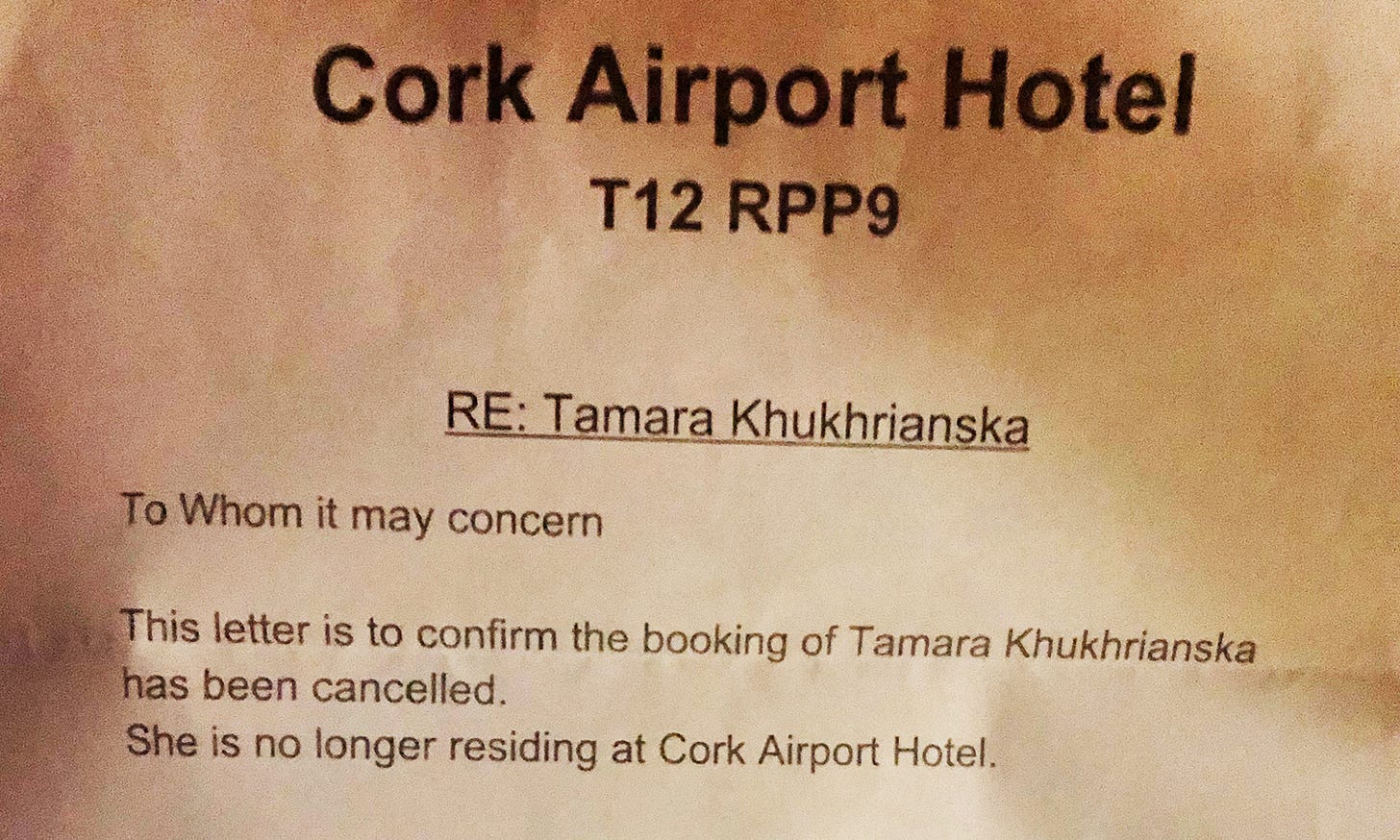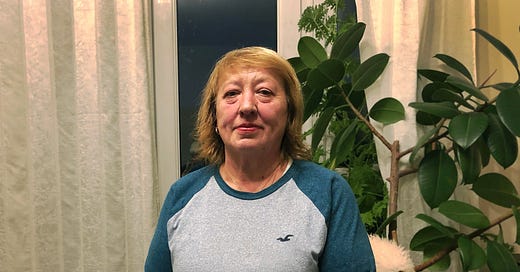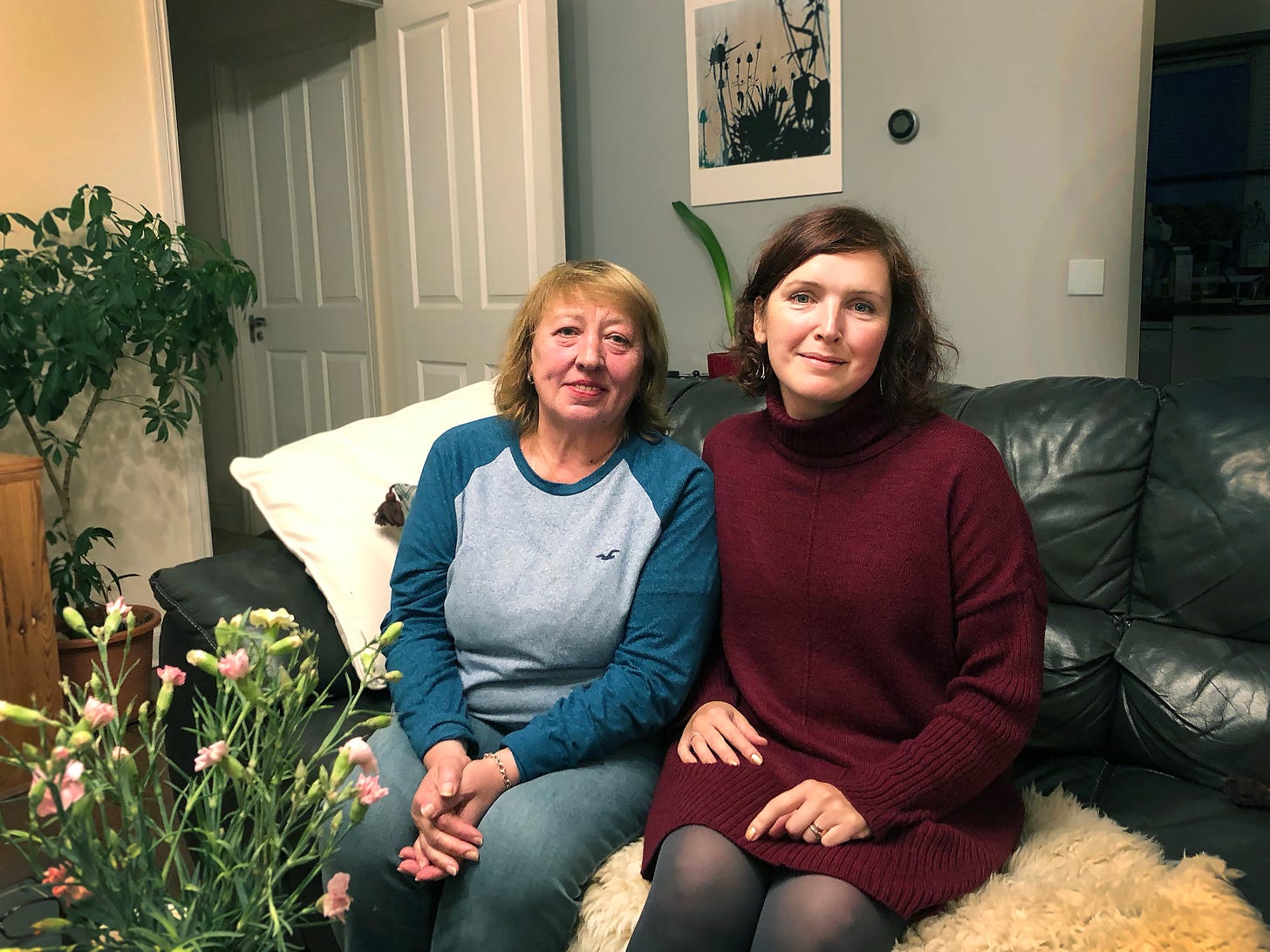61-year-old Ukrainian woman ejected from Cork hotel slept rough for two nights
Tamara Khukhrianska was told to leave Cork Airport Hotel following discharge from an overnight hospital stay at CUH, had no alternative accommodation and slept rough for two nights.
A Ukrainian woman in her early sixties, who speaks little English, was ejected from Cork Airport Hotel when returning from an overnight stay in Cork University Hospital and slept rough for two nights before being taken in temporarily by a Cork couple.
Tamara Khukhrianska, 61, had been in an altercation with roommates at the hotel on the day she was admitted to CUH with a chest infection on September 22. When she tried to return to the hotel on Friday September 23, she was told her accommodation booking had been cancelled and that she had to leave.
“I was sick for about four days,” Mrs Khukhrianska told Tripe + Drisheen, through interpreter Maria Falaleeva. “I felt very ill and there were two other women living in the room with me.” Mrs Khukhrianska said she had been in dispute with the other women about leaving the windows open while she was ill.
The Gardaí were called, but Mrs Khukhrianska was eventually taken by ambulance to CUH, where she was treated with oxygen and prescribed antibiotics and steroids.
When she tried to return to the hotel following her hospital visit, she was told her accommodation booking had been cancelled and that she had to leave.
Cork Airport Hotel is a member of the Trigon Hotel group but it is not currently open to the public because it is exclusively in use as accommodation for Ukrainian nationals seeking protection. The government is paying €135 per night to hotels to house Ukrainians seeking international protection.
“At the hotel, they wouldn’t let me in,” Mrs Khukhrianska said. “The manager came to the entrance and told me I couldn’t come in.”
Mrs Khukhrianska said she was wearing a tracksuit bottoms and hoodie and had no possessions with her on her return from hospital, and had to ask for hotel staff to fetch her handbag so she would have her purse and immediate effects with her. She said she was not provided with an interpreter during the exchange and may not have understood some elements of what was said to her.
“There was no interpreter,” she said. “Maybe he was telling me what he had against me, and maybe if I understood, I could have answered.”
Hotel staff packed up all her belongings from her shared room and she was given the option of taking everything with her or leaving it all to collect at a later date. With nowhere to go, she chose the latter.
Having spent the weekend sleeping rough, Mrs Khukhrianska found a temporary place to stay with fellow Russian speaker Maria Falaleeva, a native of Belarus who has lived in Cork since 2009, and her husband, Seán Hanrahan.
However, the couple say they are not in a position to offer long-term accommodation to Mrs Khukhrianska in their rented apartment and have been “shocked” by the lack of any interaction with services with regard to Mrs Khukhrianska’s whereabouts and state of health.
Maria Falaleeva, a freelance interpreter, had given her phone number to Mrs Khukhrianska when they met briefly on a previous occasion.
“On Sunday when she said she was still on the street, I invited her to come to me just to relax and be able to wash,” Ms Falaleeva said. “When I met her on Sunday in the city centre, she literally was in a tracksuit and hoodie and had her handbag with her and nothing else. The first thing we did was go to the shops and buy underwear and a toothbrush and a change of clothes. It was pretty shocking.”
“My main feeling is surprise: there are so many agencies, but this person is officially on the street for almost two weeks now, a lady who is not so young any more, and no-one has done anything. Tamara had called several people for help; what if I hadn’t answered, what would happen?”
Mrs Khukhrianska first arrived at Cork Airport Hotel on April 1. Formerly a local authority administrator in the Northeastern city of Kharkiv, her home was in an area devastated by bombardment early on in the conflict. Having spent two weeks sheltering in the basement of her building, she was rescued by volunteers. She says her home is now destroyed.
“Kharkiv were the first to face the military action and my building was one of the first in the firing line,” she said. “In the basement, we had no water, no toilet, nothing. Our building was hit by bombs four times before volunteers took us out.”
Mrs Khukhrianska was widowed three years ago. She has two sons currently in the Kharkiv region, although she says she doesn’t know if they are safe or not.
She had had previous minor disputes with other residents while staying at Cork Airport Hotel and had been moved from room to room, she said.
“There are many different people from very different backgrounds there, and there are some who in fact never experienced the war,” she said. “There was sometimes a big difference between me, who went through that horror, and some of the people who could not understand that there could be emotional and psychological problems. I didn’t offend or hurt anyone, but there were sometimes emotional reactions.”

A letter
Ms Falaleeva has contacted immigrant rights NGO NASC regarding the situation and Ms Falaleeva and others tried to contact the manager of Cork Airport Hotel for a letter of explanation as to why Mrs Khukhrianska’s booking with the hotel was cancelled.
On October 5, 12 days after her ejection, Mrs Khukhrianska was able to collect her belongings from the hotel. She was handed a letter that was not addressed to her, but to a HSE staff member, which stated that her booking had been cancelled, but no explanation for the decision was given.
“I can say that I’ve lived for quite a number of years and no-one has ever humiliated and mistreated me this way,” Mrs Khukhrianska told Tripe + Drisheen. “When I came to this country I was so impressed and I thought the people were so friendly and helpful and open. I wouldn’t expect that I would be treated like that in this country.”
“We may be in a miserable situation, but we who have come from Ukraine are people. I used to work in a managerial position. I might be tough, I might be psychologically damaged. But we are also people, with education and intelligence, with a life before we came here. I understand we are guests here, however, we are people. Thanks to Maria I am still alive. Nobody has even called me to check if I am still alive.”
Tripe + Drisheen made numerous attempts to contact Cork Airport Hotel management via email, phone and by leaving a note at reception.
Eventually a receptionist said it was unlikely that the hotel would agree to comment on an individual case. Trigon Hotels, who own the Cork Airport Hotel, were emailed and did not respond by the time of going to print.
A pr spokesperson for The Department of Children, Equality, Disability, Integration and Youth (DCEDIY), who are responsible for the Ukrainian response, told Tripe + Drisheen the department “works closely with accommodation service providers to ensure that the conditions pertaining to the provision of accommodation for Beneficiaries of Temporary Protection (BOTPs) are understood by all.”
“Where difficulties arise in the provision of accommodation, DCEDIY encourages BOTPs and accommodation providers to resolve issues locally in the first instance. The Ukraine Crisis Accommodation Team will, should the need arise and in instances where a satisfactory resolution to matters cannot be obtained, identify alternative accommodation for BOTPs.”





